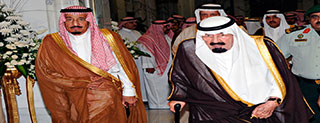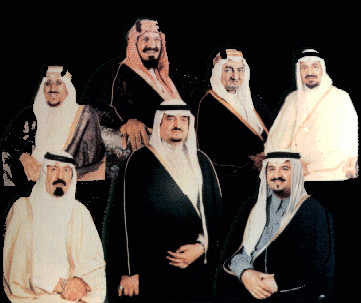Saudi Arabia the Kingdom of Darkness

It was no coincidence that a Kingdom adopting Wahhabi and Takfiri thoughts was founded in Najad and Hijaz; as its foundation had a big role in slamming all efforts toward an Arab unity against the British and French colonialism in the twenties and thirties of the past century.

While Turkish President Recep Tayyip Erdogan aspires to rebuild the Ottoman Empire, what was most striking was the establishment of a Turkish-Saudi alliance in the war on Yemen, especially since the Saudi Kingdom was a pioneer in the fight against the Ottoman Empire in the Arabian Peninsula and the disassembling of its succession.
As an overseer on the Kingdom's emergence, one cannot help but note the abundance of "coincidences" which accorded with its advent and which ultimately led to the disintegration and fragmentation of the Arab and Islamic world.
In 1915, the Darin Treaty between Al Saud and Britain was signed. The treaty approved the establishment of Al Saud monarchy in Hijaz and Najad which was to be inherited by Al Saud family.
Two years later, the ominous "Balfour Declaration", which led to the emergence of the Zionist entity in Palestine, saw light. However, "Balfour Declaration" was not different in content, style and goals from the Darin Treaty; both paved the groundwork for a repressive religious sect to establish a nation at the expense of the indigenous people.
Also, the mode of construction of both "states" was closely similar where the formation of mobs and the raids on convoys were the most prominent features.
Hence, it was not surprising that the Kingdom played a significant role in the weakening of the Arab power as well as Sharif Hussein's attempts to face Jewish mobs that eventually succeeded in establishing the occupying entity.
In a similar notion, the Saudi Kingdom fulfilled its mission against Gamal Abdel Nasser and announced a relentless war against him as it did with Sharif Hussein in the early formation of the "Israeli" entity.
Al-Saud and the Fragmentation of the Region
Historically, the Kingdom had always played the role of an instigator of the unitary systems and all Arab unity slogans. Moreover, its funds had long been poured in this context and in corrupting systems.
Though, observers of Saudi Arabia's funds would rarely find that they were spent on construction, growth and development, but had always found way to the hands of tribal and clan leaders to be disposed on favoritism and their narrow circle of followers.
Thus, it could be said that no country touched by Al- Saud's wealth remained unspoiled. The Quran verse 34 of Surat An-Naml is the clearest evidence: "Indeed kings - when they enter a city, they ruin it and render the honored of its people humbled. And thus do they do."
Money in Service of Marring
Since its inception, the kingdom had worked on weakening the nation. It had sought to dwindle the establishment of a strong modern Iraqi state.
Only when Iraq was governed by a dictatorial regime like Saddam Hussein did the Saudi Kingdom support it thru lavishly spending billions of dollars during its war against Iran.
Similarly, it prevented the establishment of a modern Yemeni state through bribery and the allocation of monthly salaries for some tribal leaders who gained wealth on the expense of impoverishing and depriving the Yemeni people.
Furthermore, the Saudi fund included Egypt as well, where it spent billions of dollars in the construction of religious schools to spread the Wahhabi ideology.
Consequently, Saudi corruption spared no region in the world except for the Zionist entity that stayed free from Saudi Arabia's ambitions.
The denominational and sectarian chaos that we are witnessing today in the Arab and Muslim world is but a repercussion of this Kingdom, its funds and destructive Takfiri ideas.
It is not surprising to see that corruption and wars only affected Arab countries that were aspirant for science, knowledge and culture as well as regimes that possessed even a minimum level of democracy and pluralism, while repressive and obscurant regimes remained untouched by the Wahhabi movement and the futility of Al Saud.
The Saudi regime is a Kingdom that fears the brightness of education, openness and diversity; it supports the act of tyranny and contempt for people in addition to partisanship, sectarianism and Takfirism. It's simply the kingdom of darkness.
Source: al-Ahed News, Translated by website team
Comments




